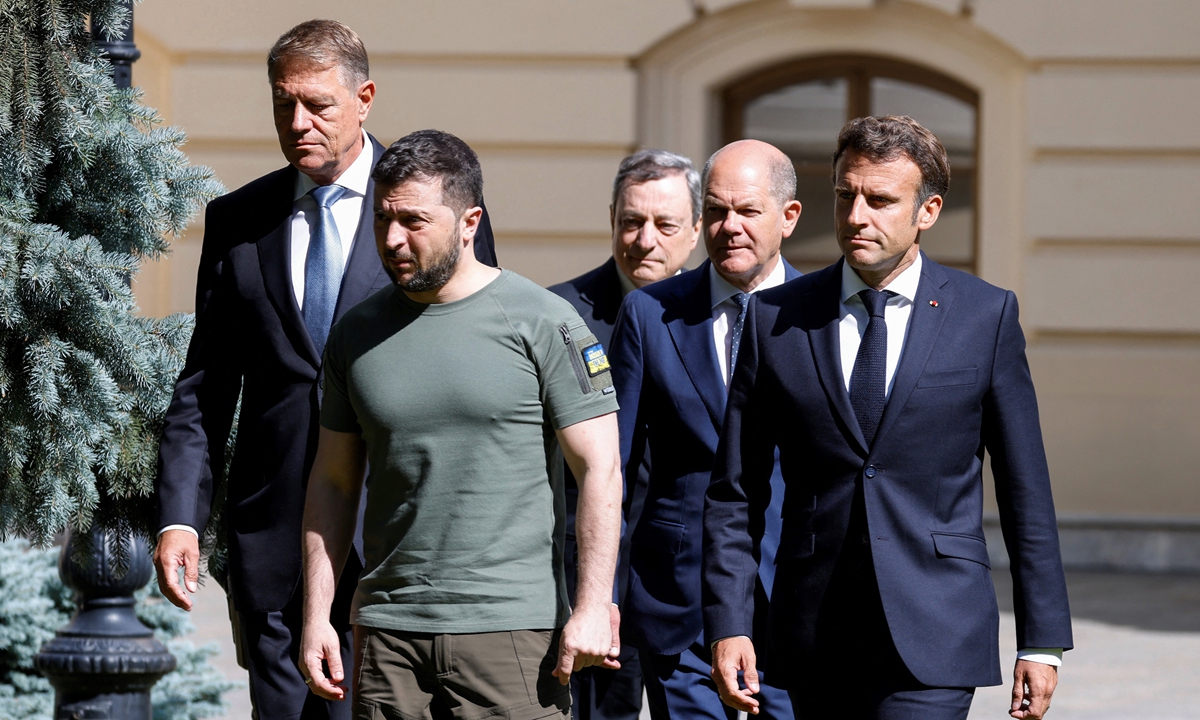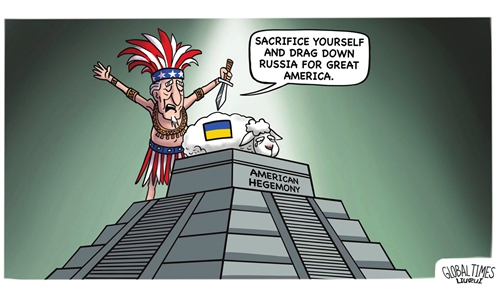
(From left) Romanian President Klaus Iohannis, Ukrainian President Volodymyr Zelensky, Italian Prime Minister Mario Draghi, German Chancellor Olaf Scholz and French President Emmanuel Macron arrive for a press conference in at Mariinsky Palace in Kiev,on June 16, 2022.
The leaders of France, Germany, Italy and Romania arrived in Kiev on Thursday. It is the first time that the leaders of France, Germany and Italy visited Kiev since the start of the Ukraine crisis. The US and Western media outlets reported that the trip shows the so-called collective European support for Ukraine.
France, Germany and Italy are considered major European powers. But their leaders' trip to Kiev is just a political show. Although they have expressed support for Ukraine, this seems to be at odds with reality. French President Emmanuel Macron and German Chancellor Olaf Scholz held several telephone conversations with Russian President Vladimir Putin, separately and together, since the outbreak of the crisis. This has triggered some grievances in Kiev.
Furthermore, both the US and the EU members vowed to supply weapons to Ukraine. However, Ukrainian Deputy Defense Minister Hanna Maliar said on June 14 that Ukraine had received only 10 percent of the promised weapons from the West, which has frustrated Ukrainian officials.
Against this background, the purpose of visit to Kiev by the three leaders of major European powers tends to comfort Ukraine's dissatisfaction and mollify Ukrainian officials. This fully embodies their hypocrisy.
Few substantive moves were seen during the three leaders' trip to Kiev. What has been relatively widely reported is these leaders' support of Ukraine's "status of immediate candidate" for EU membership. But Putin said on Friday that Russia is not concerned that Ukraine may receive the status of an EU candidate "because the EU is not a military organization."
Additionally, there are certain thresholds to gaining EU membership. Even if Ukraine is now offered candidate status, it is still a long way from obtaining full membership. Take Turkey as an example, which has been as a candidate for a membership of the bloc for more than two decades. Ukraine is in a state of war, and its economy lags behind that of EU member states in terms of its scale and development. It can be concluded that the candidate status to Ukraine is just a symbolic and conciliatory gesture.
The visit by leaders from France, Germany and Italy is indeed to join forces to engage in a policy of appeasement. Germany, Europe's locomotive, relies on Russia for energy. France and Italy are two of the biggest EU buyers of Russian gas. At least in the short and medium term, the three major EU powers cannot get rid themselves of such dependence. As a result, they have to adopt an appeasement policy while they express support to Ukraine.
Military factor also leads to the appeasement policy by European countries such as France, Germany and Italy. Additionally, in Europe, none of Russia's neighboring countries want a direct war with Russia, given that Russia is a nuclear power. The entire NATO camp, including the US, cannot engage in a direct military confrontation with Russia.
The contradictions between the EU and Ukraine are actually expanding. As a result, apart from a political show, this visit will not have any real effect. Just as Russian Deputy Chair of the Security Council Dmitry Medvedev tweeted on Thursday, "European fans of frogs, liverwurst and spaghetti love visiting Kiev. With zero use… It won't bring Ukraine closer to peace." The three leaders' visit will not change the course of the Russia-Ukraine conflict.
Big European powers' intent to arrange the fate of a small country is affected by the US to certain extent. In the post-World War II political and military system, there is no genuine independent European country, including France, Germany and Italy. Their engagement in the Ukraine crisis is passive. It will take a long time for major European countries to become politically independent genuinely. From the beginning of the Ukraine crisis, the EU has been much less European. The bloc seems to have become an extension of the US State Department, and every speech by its leaders sounds as if it were drafted by the NATO secretariat.
The ongoing Ukraine crisis continues to drag on, and Europe does not have the capability or determination to settle any problem in this regard. It is widely known that the root and solution to the crisis lies in the US, instead of Ukraine. But the US' domestic situation is a mess. Where is the way out of the crisis? It is really a conundrum.
The author is a research fellow at the Chinese Academy of Social Sciences. opinion@globaltimes.com.cn

